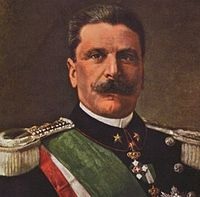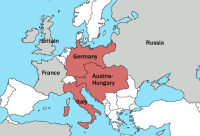 Alberto Pollio, the chief of the Italian general staff, died early on Wednesday morning, 1st July 1914, in Turin, aged 62. He had entered the Naples military college in 1860, aged 8, and was first commissioned as a sub-lieutenant of artillery in 1870. He had written military histories of Waterloo and Custozza which had been widely translated and praised.
Alberto Pollio, the chief of the Italian general staff, died early on Wednesday morning, 1st July 1914, in Turin, aged 62. He had entered the Naples military college in 1860, aged 8, and was first commissioned as a sub-lieutenant of artillery in 1870. He had written military histories of Waterloo and Custozza which had been widely translated and praised.
Lieutenant-General Pollio was an enthusiastic supporter of the Triple Alliance of 1882 between Italy, Germany, and Austria-Hungary, despite the historical enmity of the Austro-Hungarian Empire towards Italy.
 There is no evidence that Pollio’s death was anything but a simple heart attack: but the coincidence of timing has fueled conspiracy theories for a century.
There is no evidence that Pollio’s death was anything but a simple heart attack: but the coincidence of timing has fueled conspiracy theories for a century.
Italy did not enter the war until 23 May 1915, and then on the side of the Triple Entente (Britain, France, and Russia).
Pollio was replaced as Chief of Staff by General Luigi Cadorna.
On 1st July, Nikola Pašić, the Prime Minister of Serbia and Minister for Foreign Affairs, was sent telegrams from London and from Vienna:
- From M. S. Boschkovitch, Serbian Minister at London: Basing their information upon reports coming from Austrian sources, nearly all the English newspapers attribute the Serajevo outrage to the work of Serbian revolutionaries.
- From Yov. M. Yovanovitch, Serbian Minister at Vienna: There were demonstrations last night in front of the Legation. I may say that the police showed considerable energy. Order and peace were maintained. As soon as I obtain positive information that the Serbian flag has been burned, I will lodge a complaint in the proper quarters. I will report to you the result. Hatred against Serbians and Serbia is being spread among the people, especially by the lower Catholic circles, the Vienna press, and military circles. Please do what is possible to prevent demonstrations taking place in Serbia, and to induce the Belgrade press to be as moderate as possible in tone. The tendency towards us here is still the same. It is expected that the decision as to the attitude to be adopted towards Serbia and the Serbians will be taken after the funeral.
The Prime Minister of Serbia and Minister for Foreign Affairs wrote that day to “All the Royal Serbian Legations abroad”:
The Austrian and Hungarian press are blaming Serbia more and more for the Serajevo outrage. Their aim is transparent, viz., to destroy that high moral reputation which Serbia now enjoys in Europe, and to take the fullest advantage politically against Serbia of the act of a young and ill-balanced fanatic. But, in Serbia itself, the Serajevo outrage has been most severely condemned in all circles of society, inasmuch as all, official as well as unofficial, immediately recognised that this outrage would be most prejudicial not only to our good neighbourly relations with Austria-Hungary but also to our co-nationalists in that country, as recent occurrences have proved. At a moment when Serbia is doing everything in her power to improve her relations with the neighbouring Monarchy, it is absurd to think that Serbia could have directly or indirectly inspired acts of this kind. On the contrary, it was of the greatest interest to Serbia to prevent the perpetration of this outrage. Unfortunately this did not lie within Serbia’s power, as both assassins are Austrian subjects. Hitherto Serbia has been careful to suppress anarchic elements, and after recent events she will redouble her vigilance, and in the event of such elements existing within her borders will take the severest measures against them. Moreover, Serbia will do everything in her power and use all the means at her disposal in order to restrain the feelings of ill-balanced people within her frontiers. But Serbia can on no account permit the Vienna and Hungarian press to mislead European public opinion, and lay the heavy responsibility for a crime committed by an Austrian subject at the door of the whole Serbian nation and on Serbia, who can only suffer harm from such acts and can derive no benefit whatever.
Please act in the sense of the above views, and use all available channels in order to put an end as soon as possible to the anti-Serbian campaign in the European press.
In the evening of Wednesday 1st July, the funeral flotilla for the Archduke and his Countess arrived at Trieste: the caskets were transferred to a train which would carry them to Vienna for the funeral.
